All About Eve

(and what Adam should have used later to find the worm in the apple)
To demonstrate how powerful these little babies are, here’s a red Klapper apple from a German gardening magazine published in Weimar in 1809:

As Adam might have said to Eve:
Adam: Evi, if you pick it with the fruit spur still attached to the stem, you’ve killed our crop for the year after next.
Eve: Just bite it, Adam. Just shut up for once and bite it.
In the interest of furthering the cause of scientific accuracy in a web universe otherwise sometimes inaccurately perceived as inaccurate (even though it’s the first accurate universe we’ve ever really had) here’s an example of what that same apple looked like once the physicists of Stanford university had got at it with their X-Ray gogs:
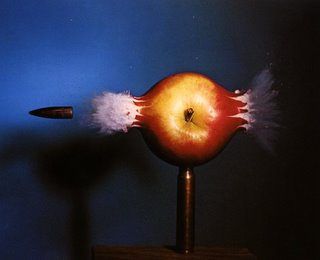
after escaping from the clutches of a subatomic physicist,
as seen through XRay Gogs
Hot news from the testing labs of the garden of Eden!
A daily, genetically modified apple could one day put dentists out of a job!
Scientists in Kent are planning to convert apples and strawberries into antibacterial treatments that would protect against tooth decay!
Now, there’s a plan.
The following is a free prime-time political announcement provided free to members of all political parties:
Pablo Picasso said: "Art is not the application of a canon of beauty but what the instinct and the brain can conceive beyond any canon. When we love a woman we don't start measuring her limbs."
Submitted by The Committee to Reelect Eve
Harold: "Thanks, Eve."
Eve: "People have short memories, Harold."
Harold: "I know. I tell ya, I know."
Eve: "And I know you know. Say, can I just send along a little brochure from my people to your people? Can I?"
Harold: "Sure, Eve. Shoot."
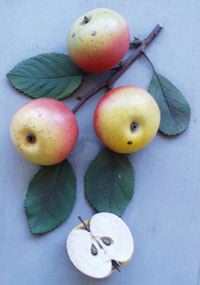
Model of Noble Borsdorfer apples, carved out of linden wood and painted in Northern Czechoslovakia somewhere between 1920 and 1930.
Eve: Well, you can see, Harold, why I picked a pear in the garden instead.
Harold: Sure can, Eve.
Eve: Liable to break your teeth. If you open it, you’ll see what I wrote on the inside:
So, I opened Eve's election brochure and read its core, its heart, its kernel, its seed, its little nut:
For Plato, memory was a wax tablet.
For St. Augustine, it was a storehouse.
For Sigmund Freud, it was a "mystic writing pad"
For the anti-modernist American poet, Amy Lowell, it went like this: "Art is the desire of a man to express himself, to record the reactions of his personality to the world he lives in."
For modern psychologists, it was first a photograph, then a phonograph, then the cinema, then a telephone exchange.
For Palbo Picasso, it was what you did when you did what you did, like this: "We all know that art is not truth. Art is a lie that makes us realize the truth."
For post-modern psychologits, it is a computer.
For at least one Mexican poet and diplomat, it is like so: Art is an invention of aesthetics, which in turn is an invention of philosophers... What we call art is a game. Octavio Paz
Oh dear.
Ah, folks, just to give you a little background, as Canada slides into a holiday election, here’s a little promotional material leftover from an earlier election:
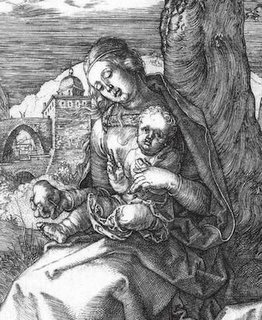
Always the innovator, Albrecht Dürer took this photograph with the camera of his mind. I tell ya, Dale Carnegie said that the essence of all art is to have pleasure in giving pleasure, but the baby Jesus does not look amused here, at all. Well, actually, he looks like a pope. Is that the Boy Cub salute he’s giving there?
Adam: Look at the pear. It’s the pear that’s important.
Harold: You mean, in this honourable tradition, in this titillating view of art, in this art as Casanova with a pomade, in this remember-when-we-were-young-and-made-whoopee-all-night view of art, these are our art galleries now, our museums of memory: Super Valu, IGA, Thrifty’s, Save On Foods, Save On More, Safeway, Loblaws? You mean, back in the days of Ronald Reagan and the Evil Empire, back in the daze of Darth Vador and Rambo, we used to hear how the supermarket system, with its ability to provide endless amounts of food, was the supreme achievement of the capitalist system, cuz those Russkies couldn’t even manage to get the harvest in?
Adam: Uh. I dunno.

A Pear Seen Through X-Ray Gogs.
Notice the particle of light exploding from the pear at the far left, like the bullet from a gun, or Adam’s good luck coming to an abrupt end. Ouch.
Adam should have thought about that before he took a bite. As Alexander Chase said: "Memory is the thing you forget with."
He got that right.
Still, I remember well when the Iron Curtain fell in Eastern Europe. What everyone in the Western media was talking about then was stereos, about people in the East wanting access to stereos, and I remember thinking, Stereos? Stereos?
Alright then, here’s a link to the live in-store web cams of Super Stereo Warehouse. Their salespeople are trained in product knowledge and system design. Just so you know: they do not stock or sell Factory Refurbished or used equipment.
As Willa Cather said: Some memories are realities, and are better than anything that can ever happen to one again.
She got that right.
As Eve once said, primly setting down a cup of tea in her living room, "It was tough in the earlier days, trying to decide whether to become a particle or a wave."
"Or just to stay as both," piped in Adam from his Lazyboy.
"So what did you decide?" I asked, holding out my panasonic portable voice recorder.
Whrrrrrrrrr.
"Particle," said Adam.
"Wave," said Eve, at the same time.
They both burst out into laughter.
Well, at least they could still laugh about it.
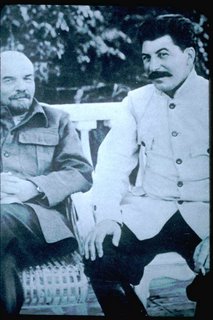
Bizarro.
But that’s the way it goes when the world is poetry, isn’t it.
(Don’t mind me. Just think of me as Franz Kafka scurrying around in the basement, unscrewing fuses from the circuit box, screwing in new ones, sticking pennies behind some others so they don’t blow again, while waiting for permission to enter The Castle.)
A note from the Castle Administration:
Dear Franz,
we have received your entrance for admission, blah blah blah, duly processed, blah, blah, ...let you know when your application has been reviewed...et cet era.
Signed,
Adam.
p.s. If you’re going to blame anyone, maybe you should blame the futurists.
okee dokee!
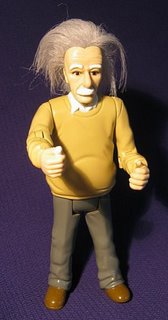
in disguise as an Einstein Action Figure
trying to break into Kafka’s Castle.
For the full text of the script for the movie, go here . Yes, a script!
OK, take Pound, if you like.
Adam(Interjecting): "Not a futurist, really."
Eve: "Oh, he’s close enough, dear. Leave the boy alone. Don’t tease him so."
Harold: "Yeah."
Adam: "For instance, in the company of such other amateur philosophers as T.E. Hulme, Pound devised a theory that poetry was an art best made through the principles of the assembly line."
Eve: "And your point, dear?"
Harold (Helpfully, and forgetting my own advice not to get involved in domestic disputes.): "Well, in Pound’s way of thinking, a poem consisted of words set side by side, without links between them."
Eve: "Well, sure. He was an American, after all. The poem wasn’t in the words, but in the thought that was generated by a person, a living person, who observed those objects." Eve looks at me pointedly. "So to speak. It was a way of using mechanization to free people from mechanization."
Adam: "So to speak."
Ah. Kind of like playing cards, really.
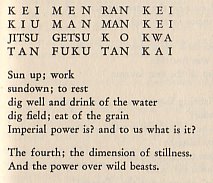
from Canto XLIX
When Adam saw that, that’s when he typed up a cease and desist court order and had it nailed to my door:
By 1939, Pound’s card game had been going on for years. Way too many years. He had bet the shirt off his back. Everyone had bet the shirts off their backs. On the eve of war, Pound interrupted the game to make a last trip back to the States from Italy, to convince Henry A. Wallace, then American Secretary of Agriculture, and his longtime correspondent, Senator William Borah, to convince the Franklin d. Roosevelt, the President of those United States, that war was not in the interests of American society, or the President, or the Secretary of Agriculture, because going to war would violate, and maybe even negate, the principles of the American constitution.
If Pound was my lawyer in my case for admission to the castle, the case might have gone like this:

when a plea of insanity is the same as the admission of the writing of poetry.
Pound figured that as a poet, and, what’s more, a poet writing propaganda tracts about economics and submitting letters to the editor, under pseudonyms, in newspapers around the world, literally, that he was the man who knew, that everyone else was groping in the dark.

imagine if he had been broadcasting this from Hanoi in 1968.
Sounds like he hadn’t quite given up on the caviar by then, doesn’t it.
So, they don’t have caviar in my local supermarket, but, I tell you, what they do have is the next best thing: pears. You bet. Think of them as the poker chips in Ezra’s card game with Adam and Mussolini. Really. You know that tree in the Garden of Eden, the one that caused all the trouble by hiding a ssssssnake, and some juicccccccy fruit, and Eve picked it and all, and said, Adam, bite me, I mean, blush, bite this. Well, darn thing was a pear tree, actually. Yeah, yeah, I know, that little sapling, that weed, that sprout, actually, that wee slip of a thing nudging aside the lips of the grass to show itself usually comes up at Sunday dinner table conversation as an apple tree, but it doesn’t say apple tree anywhere in the Bible, actually. Not really. Here’s what it does say, really:
And God said, Let the earth bring forth grass, the herb yielding seed, and the fruit tree yielding fruit after his kind, whose seed is in itself, upon the earth: and it was so. Genesis 1:11
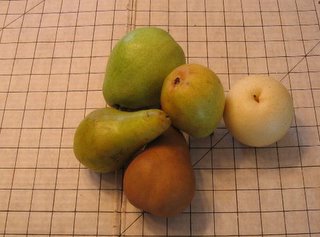
I don’t do no catch and release.
Bosc, Beurre D’Anjou, Yellow Williams, Concorde, and a Shy Little Japanese Number with a Clipped Stem so She Doesn’t Poke her Sisters
Now, ain’t that nice.
So, some artists, like Dürer, thought they would clarify the issue. You gotta remember that in those days apples were for making cider. Darn things tasted like wood. You gnawed on them. It was like eating the knob off the end of a stair banister that had been soaked in honey. It was like, oh, eating the snake’s head off of your walking stick, grrrrrrrrr. No, if you wanted to actually eat something, if you wanted to get your teeth into a little tenderness, like a love poem from old Provence, strummed by a troubadour blowing kisses to his master’s mistress, you bit into a pear, hands down. Or at least a woman did. No gnawing on banisters for them. Besides, the things grew in every meadow. Wasps crawled over the fruit. You went out amidst the cows and picked them up.
Bzzzzzzzzz.
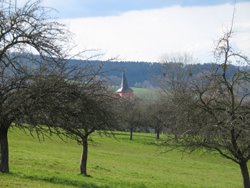
Adam’s cows used to graze under these trees. As you can see, the trees — like the church steeple in the background — had to be extra tall, so that the cows couldn’t nibble off all the fruit before it got ripe. In the fall, my father told me, those trees roared with wasps.
The German word for a fruit planting like this is Streuobstwiese. Just so you know.
Try saying that ten times real fast with oatmeal in your mouth!
When my father (Well, he was only 12 years old then, but you get the idea.) got really hungry during the last year of the Second World War, he used to sneak down to the Siegfried Line, Germany’s so-called Western Wall of defence, and in those abandoned farming fields along the Eastern side of the river and facing the big bad American Army in Alsace, he used to sneak amongst the pillboxes, out past the concentration camp where the French Resistance was sawing wood, and pick the pears off of the trees like that, which had been completely abandoned to the Yankee guns, and God.
God.
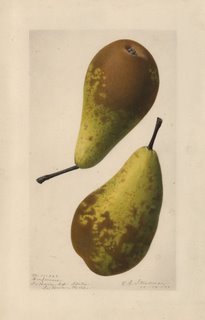
(one coming, one going)
This picture was taken using now historical Copperplate technology
Besides, the darn things looked like breasts.
And it didn’t stop there. In the early twenty-first century, women’s magazines advertised different weight loss and fashion strategies for women with apple-shaped bodies and women with pear-shaped bodies. Who knew!
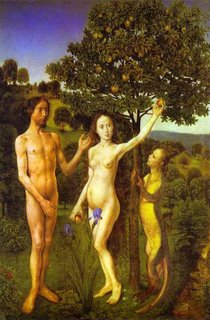
as Hugo Van der Goes saw it (some time before 1470), sandwiched between Adam of the big feet and the handshake, just back from the NBA finals by the looks of him, and, what’s that on the right, his agent?
Oh, it’s a dance! I got it. It’s a square dance in a country hall. The guy on the right wants to butt in. Maybe it’s me!
Adam: "Harold, you’re going to need a bolo tie. Honey, do I have a tie Harold could borrow?"
Eve: "Allemand and Do-se-do, Follow-your-neighbor and Explode the line!" She takes me by the hand and around we go.
Adam: "Remake (the Column) and Scoot & Weave!" It’s getting dizzying.
Eve: "Slip, Slide, Swing, Slither!"
Adam: "Chase Your Neighbor"
Eve: "Cross Your Neighbor."
Harold: "Whoa!"
Adam: "I’m going to chase you, that’s what I’m going to do!"
Eve: "Do your best! (Squeal.)"
Ahem. Blush. Well. Let’s leave them now, shall we, flounced skirts and petticoats and bolos flying.
To set the scene: on one side of the dance hall there is reason. On the other? Why, counter-reason. These black-suited boys are lined up like missile silos in Siberia and Nebraska. They are lined up like particles of light trying to decide between candidates in a Canadian election.
In this card game gone wrong, in this trading of jokes between Heisenberg and Dürer, in this Siegfried Line and this We’re Going to Hang our Washing on the Siegfried Line, in the American version by Jimmy Kennedy & Michael Carr:
We'll just rub along without a care.
We're going to hang out the washing on the Siegfried Line
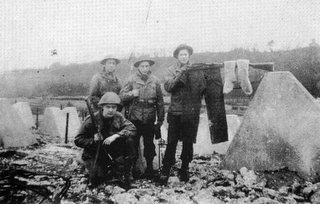
(showing how stiff their clothes can get
in the good old fashioned German snow on the Siegfried Line).
Either that, or those doughboys used too much starch.
and the German version, which my father sang when he visited the pillboxes with his youth group:
When the big German washday is finally here, man,
you won’t need to ever wash your clothes again.
Oh, please do.
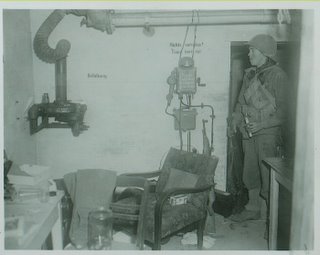
American soldier inside a pillbox on the Siegfried Line.
After the American takeover of the film, and a few months after my father came with his youth group, and the soldiers there, deep underground, stuck their fingers in their mouths and sucked and made bad sexual jokes. I think the sign above the telephone pretty well says it all: "Don’t talk secrets. The enemy is listening."
It’s enough to make a guy want to just abandon words altogether. Here goes:

after eating too many apples on the Streuobstwiese outside Nüremberg.
poem by Harold Rhenisch
Adam: "You know, people have blamed the ruin of the world on Eve and me for a long time. It’s getting a bit tiring, actually."
Eve: "They’re just jealous of the things we do in bed."
Adam: (Smiles.) "In our modern world of destruction and environmental decay, poetry and physics are not innocent bystanders, either. Why do people always look to us, then?"
Eve: "They’re the ones that started all this. They replaced the world, not us."

from Terry Gilliam’s Brazil
Right. So, I asked Adam and Eve about the snake in Goes’ picture of the Streuobstwiese. It was indecorous, I know, but I just had to ask.
Eve: "Does he look like a snake to you?"
Adam: (Putting his arm around Eve and giving a squeeze.) "Actually, he looks like a poet, don’t you think?"
Well, let’s look, shall we? Here’s our poet, viewed across the span of history:

Harold: Psssst! It looks like Chagall ate too many little green apples, actually.
Adam: To tell you the truth, Chagall’s looks a lot like Isaac Newton,
after taking a bite out of Einstein’s physics. Ha. Ha. Ha.
Eve: "Oh, you boys. Would you stop it. All you’re doing here together in our virtual selves in this virtual space you like to call Canada is fussing with the leftover pieces of God’s smashed creation on the wall of my refrigerator.

scattered across the front of a nuclear winter.
Harold: "Our lives depend on it, Eve. Our souls depend on it."
Eve: "Souls! Oh, don’t get me started. If I think of all the trouble in the world that has been started because of these souls!"
Next week: The varied positions of a love affair with pears.

0 Comments:
Post a Comment
<< Home